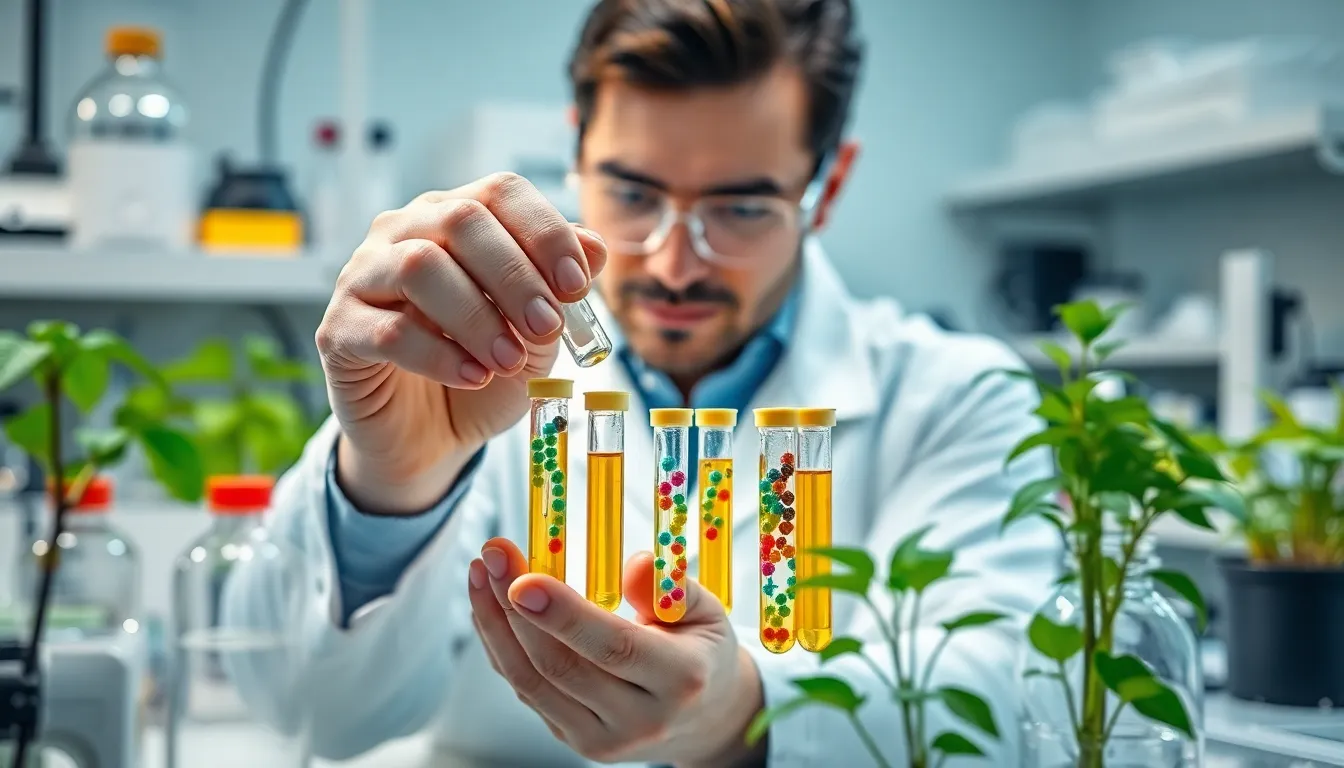In a world where science fiction often meets reality, biotech peptides are the superheroes of the biotech universe. These tiny chains of amino acids pack a punch, promising everything from enhanced muscle recovery to skin that practically glows. If you thought peptides were just for science nerds, think again—these little marvels are making waves in health and beauty, and they’re here to stay.
Table of Contents
ToggleOverview of Biotech Peptides
Biotech peptides represent a vital class of compounds with diverse applications in health and beauty. These short chains of amino acids play crucial roles in numerous biological processes. Their ability to influence cellular communication makes them valuable in therapies and cosmetic formulations.
Growth factors, signaling molecules, and hormones classify many biotech peptides. Each type serves specific purposes. For instance, collagen peptides enhance skin elasticity, while creatine peptides boost athletic performance and muscle recovery. Research shows these compounds also promote wound healing and tissue regeneration.
Manufacturers often create biotech peptides via recombinant DNA technology. This method ensures high purity and consistency in production, leading to effective formulations. As a result, biotech peptides have gained traction in the cosmetics industry, with skincare products incorporating these ingredients for visible results.
Recent studies indicate that consumers increasingly prefer products containing biotech peptides. Their demand stems from the desire for scientifically-backed solutions to aging and skin damage. Furthermore, athletes seek out supplements with these peptides to optimize performance and recovery.
The future of biotechnology continues to expand as more research uncovers the potential of peptides. Innovations in peptide synthesis and delivery systems promise enhanced efficacy in treatments. A growing understanding of their mechanisms will likely lead to new therapeutic applications and improved wellness products.
Applications of Biotech Peptides

Biotech peptides serve a range of vital purposes in health, wellness, and beauty. Their applications span both therapeutic and cosmetic fields.
Therapeutic Uses
Biotech peptides demonstrate significant promise in therapeutic contexts. They play essential roles in the treatment of various conditions, including metabolic disorders and cardiovascular diseases. Growth factor peptides promote tissue healing, while signaling peptides aid in cellular communication, enhancing the body’s natural healing processes. Clinical research has highlighted their anti-inflammatory properties, making them valuable in pain management. Furthermore, they support muscle regeneration, which is crucial for recovery in athletes.
Cosmetic Applications
Biotech peptides find extensive use in cosmetic formulations. Collagen peptides improve skin firmness, enhancing elasticity and reducing the appearance of wrinkles. Skin-firming peptides stimulate collagen production, resulting in a youthful appearance. Growth factor peptides rejuvenate aging skin by promoting cellular turnover. Microneedling products often incorporate peptides to boost efficacy during treatments. Consumers increasingly seek products with biotech peptides, reflecting the growing trend toward scientifically supported skincare solutions.
Production Methods
Biotech peptides are produced through various methods that ensure their effectiveness and quality. Understanding these production methods reveals insights into peptide applications.
Chemical Synthesis
Chemical synthesis involves creating peptides through stepwise chemical reactions. This method allows precise control over the peptide sequence, which is crucial for achieving specific biological activities. Solid-phase peptide synthesis remains a common technique, facilitating efficient synthesis even for longer sequences. Through protective groups and coupling reagents, manufacturers can achieve high yields with minimal impurities. Applications in research and therapeutic development often leverage the customizability of chemically synthesized peptides, promoting targeted effects.
Recombinant DNA Technology
Recombinant DNA technology plays a vital role in biotech peptide production. This technique utilizes genetic engineering to insert peptide-encoding genes into host cells, such as bacteria or yeast. As the host cells express the peptide, large quantities of the desired product can be harvested. Consistency and purity stand out as significant advantages of this method, leading to reliable formulations for various applications. Growth factor peptides and therapeutic agents often emanate from this production process, enhancing both cosmetic and medical products.
Market Trends and Future Prospects
Market trends indicate a notable increase in the global demand for biotech peptides. Recent studies reveal that the global peptide market is projected to reach approximately $56 billion by 2025, reflecting a compound annual growth rate (CAGR) of about 9.3%. Companies are increasingly investing in research and development, pushing the boundaries of peptide applications.
Consumers show a strong preference for products containing biotech peptides, driven by a quest for effective skincare solutions. Innovations in peptide technology enhance formulations, leading to superior results in both therapeutic and cosmetic applications. Nutraceuticals, particularly in sports nutrition, are witnessing a surge as athletes seek supplements that optimize performance and recovery.
Therapeutic applications of biotech peptides expand as new clinical studies highlight their effectiveness. Growth factor peptides demonstrate significant potential in regenerative medicine, particularly for treating wounds and metabolic disorders. Advances in understanding peptide mechanisms contribute to the development of targeted therapies.
Production methods underpin the success of biotech peptides. Recombinant DNA technology remains crucial, enabling the mass production of high-purity peptides. Chemical synthesis also plays a key role, as it allows for precise custom creation of peptides tailored for specific applications.
Future prospects in this sector look bright. Research continues to explore novel peptide sequences and combinations, paving the way for breakthrough treatments. The integration of biotechnology with personalized medicine may lead to enhanced healthcare solutions, revolutionizing patient outcomes. As awareness of biotech peptides grows, the market is poised for continued expansion and innovation.
Biotech peptides are transforming the landscape of health and beauty with their remarkable benefits. As these compounds gain traction in both therapeutic and cosmetic applications, their potential to improve quality of life and enhance physical appearance becomes increasingly evident.
The ongoing advancements in production techniques ensure that consumers receive high-quality, effective products. With the market projected to grow significantly in the coming years, it’s clear that biotech peptides will play a pivotal role in shaping the future of wellness and aesthetics.
As research continues to unveil new possibilities, the integration of biotech peptides into everyday products will likely become even more prevalent, making them an essential component of modern health and beauty solutions.




